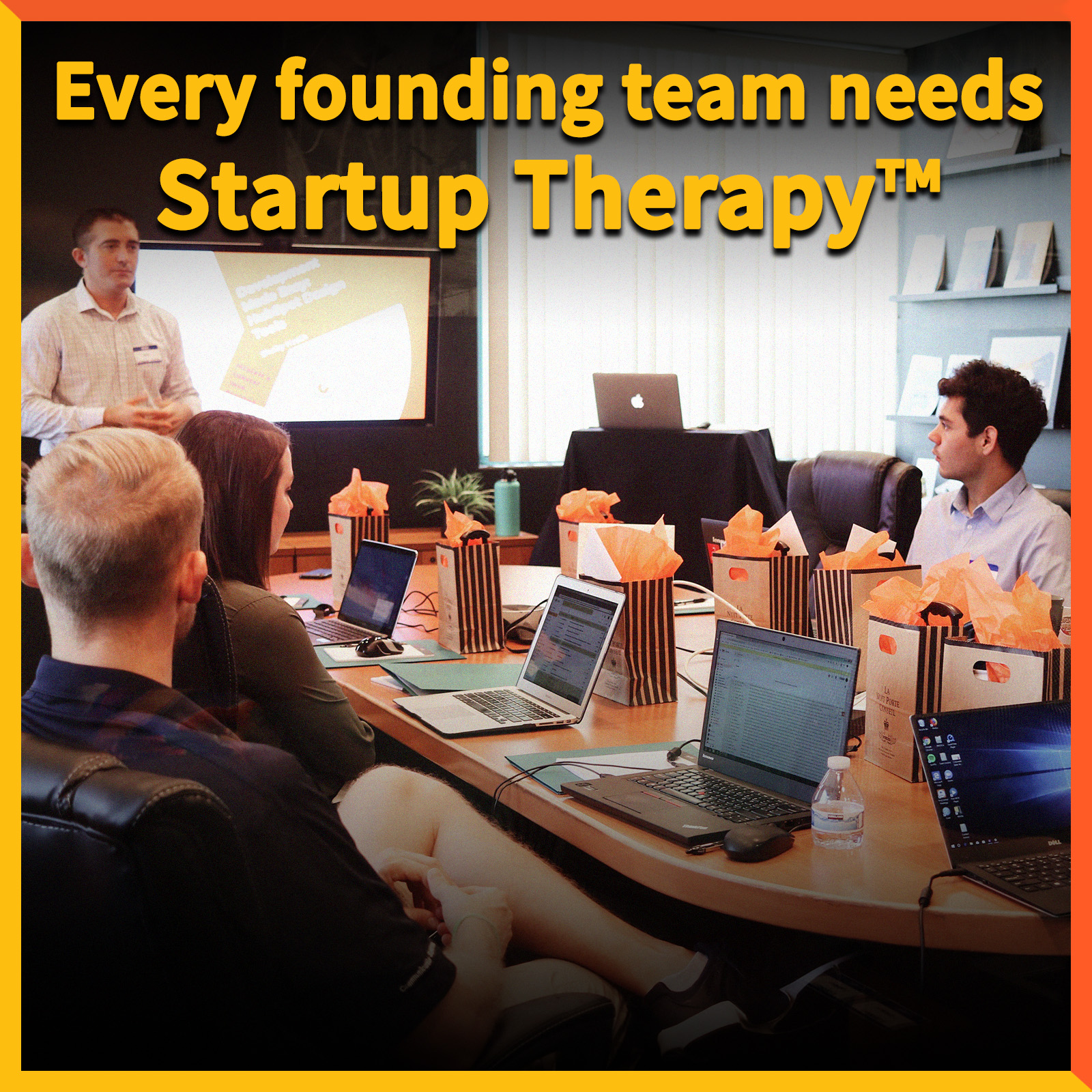I have long (sort of) joked that you either get StartupTherapy™ or the founding team ends up in serious therapy. But the reality is, entrepreneurship will test you and it will test your relationships, so prepare for it, and address it. One thing that can be deadly is the issue of lost founders. What’s a lost founder? Someone (or someones) who help found the company, get a big chunk of founder’s equity and then walk away from the hard work of building a business. I won’t go into some of the reasons why this happens, in the heady early days, no one can imagine it won’t be a quick path to untold riches! But, founders do, in fact, walk away, and more commonly than you might think.
 Many people think that founders shares are for the “idea” of the business. This is not true. LIkely there are 3-5 teams out there, just as capable as you are, who have a similar idea. The founders shares and early stage employee shares are to reward the people who BUILD the business. This is one reason that vesting of founders shares comes up often with VCs (which I loathe, but you can see their point of view).
Many people think that founders shares are for the “idea” of the business. This is not true. LIkely there are 3-5 teams out there, just as capable as you are, who have a similar idea. The founders shares and early stage employee shares are to reward the people who BUILD the business. This is one reason that vesting of founders shares comes up often with VCs (which I loathe, but you can see their point of view).
Unfortunately, a lost founder is a disaster. Why? Well, when the remaining founder tries to raise money, the lost founder is usually fatal. They can’t get docs signed by they missing founder, and there’s too much equity that isn’t productive. No investor, angel, corporate or VC, wants to get in the middle of a messy cap table! And few employees want to come and work for a startup that can’t give them enough equity. Now, there are certainly ways to “wash out” a lost founder, but again, it’s messy and takes a lot of lawyer bills. There’s are better ways! However, they take some planning and forethought.
So, what do you do, and how do you protect the company, and yourself as a co-founder. First, consider Slicing Pie or a similar approach for founders shares, particularly in the earliest (usually boot-strapped) phases. It’s an excellent start to fair allocation of founders share.
But no matter how you allocate those early shares, I strongly encourage you to have a buy-sell agreement.
 But no matter how you allocate those early shares, I strongly encourage you to have a buy-sell agreement. Agree up front, at the earliest stages, such as before even incorporating, on the terms upon which another co-founder (or the company itself) can buy back the other founder(s) shares if there is a “parting of the ways”. If everyone creates the terms which would be fair both as a “staying founder” and a “leaving founder”, then they will be easier to swallow if things reach that point.
But no matter how you allocate those early shares, I strongly encourage you to have a buy-sell agreement. Agree up front, at the earliest stages, such as before even incorporating, on the terms upon which another co-founder (or the company itself) can buy back the other founder(s) shares if there is a “parting of the ways”. If everyone creates the terms which would be fair both as a “staying founder” and a “leaving founder”, then they will be easier to swallow if things reach that point.
 Now, those terms need to be CHEAP, and that is very important. If a onetime founder walks away in the very early stages, then they should get pennies for their shares, why? Because they are still worth pennies! If someone has done work and all the founders have agreed up front that the work should be compensated, then include in your agreement how the shares can be bought without requiring a lot of cash. Or consider allowing a founder to keep a small number of non-voting shares (gotta have this in the legal docs!).
Now, those terms need to be CHEAP, and that is very important. If a onetime founder walks away in the very early stages, then they should get pennies for their shares, why? Because they are still worth pennies! If someone has done work and all the founders have agreed up front that the work should be compensated, then include in your agreement how the shares can be bought without requiring a lot of cash. Or consider allowing a founder to keep a small number of non-voting shares (gotta have this in the legal docs!).
What are issues you want to consider? (note this is not legal advice, but some ideas you should consider discussing with your legal counsel!)
- At what point in company development will shares allocated?
- Have you used slicing pie or a similar method to value everyone’s contribution appropriately?
- Do other founders or does the company have the first right to buy a departing founders shares? How might this be allocated?
- How is it handled if neither founders or the company have any cash on hand (which is true for a long time!)? What kind of note structure is acceptable (agree in advance)?
- Make sure founder shares cannot be sold outside of the original group or the company for any reason. Only the company itself has the right to sell shares outside the company, at least until it is well established.
- Make sure the buy-sell agreement includes a clause that the selling founder no longer has to approve any stock transactions and that they have no voting rights (even if they get to keep some shares)
- And, like all legal docs, make sure the departing founders agrees to sign any future needed legal docs to make all this work.
More often than not, at least one of the founding team will need to step away from the company. As one of my Directors and mentors said ‘When things “go wrong” if everyone behaves gracefully, the relationships can still stay intact. So start by setting out the terms “just in case”.
Don’t forget, these issues are related to a recent post about the risks of joining an accelerator, and how it can cost you your company!
If you are planning to raise funding for your startup,
Click to Get our FREE VentureWrench Guide to Investor Capital
50 pages of insider insights to help you succeed!

